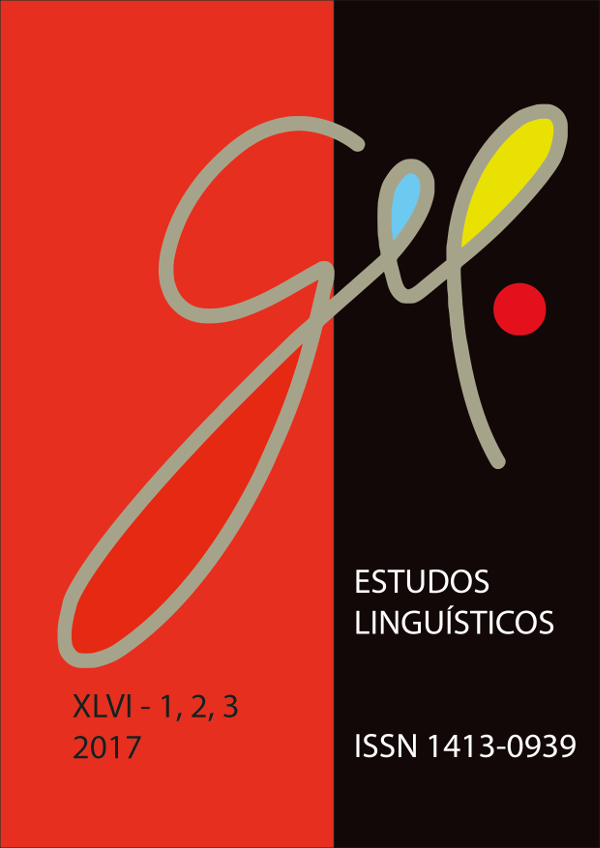Word Finding Difficulties: inferences from a qualitative analysis of interviews with aged individuals
DOI:
https://doi.org/10.21165/el.v46i2.1660Keywords:
neurolinguistics, language and aging, Word Finding Difficulties.Abstract
Studies on aging have been increasing in Brazil and around the world, considering what many researchers have called as "the revolution of longevity" (HÉBERT, 2015; MINAYO; GUALHANO, 2014). However, despite these advances, there have been only few linguistic investigations regarding elderly speech production in Brazil. In this context, our work is an attempt to evidence how studies based on a socio-historical-cultural perspective can contribute to a better understanding of language in aging. This work aims to reflect more specifically on the phenomenon Word Finding Difficulties – one of the main complaints of the elderly people, according to Burke and Shafto (2004) – in the "normal" aging context (without language alteration). Our reflection is based on the Enunciative-Discoursive approach to Neurolinguistics and mobilizes the works of Vygotsky (2010), Luria (1990, 1991), Damico et al. (1999) and Bakhtin (2003), among other important authors.
Downloads
References
AMOSSY, R.; HERSCHBERG-PIERROT, A. Estereotipos y clichés. Buenos Aires: Eudeba, 2001. A PIADA do povo brasileiro. I miei appunti. Disponível em: <https://mieiappunti.wordpress.com/2010/02/03/povo-brasileiro/>. Acesso em: 28 jul. 2017.
ARBUCKLE, T.; GOLD, D. Aging, Inhibition, and Verbosity. Journal of Gerontology: Psychological Sciences, Waltham, v. 48, n. 5, p. 225-232, 1993.
BAKHTIN, M. Os gêneros do discurso. Estética da Criação Verbal. São Paulo: Martins Fontes, 2003.
BRANDÃO, L. Produção da linguagem e envelhecimento. In: PARENTE, M. A. M. et al. Cognição e envelhecimento. Porto Alegre: Artmed Editora S.A., 2006.
BRANDÃO, L.; PARENTE, M. A. DE M. Os estudos de linguagem do idoso neste último século. Estudos Interdisciplinares sobre o Envelhecimento, Porto Alegre, v. 3, p. 37-53, 2001.
BURKE, D. M. Language, Aging, and Inhibitory Deficits: evaluation of a theory. Journal of Gerontology: Psychological Sciences, v. 52B, n. 6, p. 254-264, 1997.
BURKE, D. M.; SHAFTO, M. A. Aging and language production. Curr Dirr Psychol Sci, v. 13, n. 1, p 21-24, 2004.
CALVINO, I. Se um viajante numa noite de inverno. São Paulo: Companhia das Letras, 2011.
CARMELINO, A. C.; POSSENTI, S. O que dizem do Brasil as piadas? Linguagem em (Dis)curso – LemD, Tubarão, v. 15, n. 3, p. 415-430, set./dez. 2015.
COUDRY, M. I. Diário de Narciso: discurso e afasia. São Paulo: Martins Fontes, 1988 [1986].
DAMICO, J.; SIMMONS-MACKIE N.; OELSCHLAEGER, M.; ELMAN, R.; ARMSTRONG, E. Qualitative methods in aphasia research: basic issues, Aphasiology, 13, p. 651-665, 1999.
DELL, G. S. A spreading activation theory of retrieval in language production. Psychological Review, 93, p. 283-321, 1986.
FARACO, C. A. Linguagem e diálogos: as idéias linguísticas do círculo de Bakhtin. São Paulo: Parábola Editora, 2009.
FRANCHI, C. Hipóteses para uma teoria funcional da linguagem. 1975. 259 f. Tese (Doutorado em Linguística) – Instituto de Filosofia e Ciências Humanas, Universidade Estadual de Campinas, Campinas, 1975.
FUGIWARA, R. E.; NOVAES-PINTO, R. C. Avaliação de compreensão nas afasias. Estudos Linguísticos, São Paulo, 42 (2), p. 903-915, 2013.
GARFINKEL, H. Studies in ethnomethology. Englewood Cliffs, NJ: Prentice Hall, 1967.
GARRETT, M. F. The Analysis of Sentence Production. In: BOWER, G. (Org.). The Psychology of Learning and Motivation, 9, New York: Academic Press. 1975.
GERALDI, W. Linguagem, interação e ensino. 1990. 334 f. Tese (Doutorado em Linguística) – Instituto de Estudos da Linguagem, Universidade Estadual de Campinas, Campinas, 1990.
GÓES, M. C. R. A abordagem microgenética na matriz histórico-cultural. Caderno Cedes, v. 50, p. 9-25, 2000.
GOODWIN, C. Conversational organization: interaction between speakers and hearers. New York: Academic Press, 1981.
HÉBERT, R. A revolução do envelhecimento. Ciência & Saúde Coletiva, v. 20, n. 12, 2015.
HERITAGE, J. Garfinkel and ethnomethodology. Cambridge: Polity Press, 1984.
KOTIK-FRIEDGUT, F. Development of the Lurian Approach: a cultural neurolinguistics perspective. Neuropsychology Review, v. 16, n. 1, p. 43-52, 2006.
LOURENÇO, R.; MASSI, G. Linguagem e Velhice: considerações acerca do papel da escrita no processo de envelhecimento. Curitiba: Juruá Editora, 2011.
LURIA, A. R. Cognitive Development: its cultural and social foundations. Cambridge, Massachusetts. London: Harvard University, 1990.
_____. Curso de psicologia geral. Rio de Janeiro: Brasileira, 1991.
MARCUSCHI, L. A. Introdução. In: PRETI, D. A linguagem dos idosos: um estudo de análise da conversação. São Paulo: Contexto, 1991.
MAZUCHELLI, L. P. O efeito de práticas sociais com leitura e escrita no caso de uma afasia progressiva: (re)encontros. 2012. 145 f. Dissertação (Mestrado em Linguística) – Instituto de Estudos da Linguagem, Universidade Estadual de Campinas, Campinas, 2012.
MINAYO, M. C. S.; GUALHANO, L. Cuidados frente à revolução da longevidade. Ciência & Saúde Coletiva, Rio de Janeiro, v. 19, n. 8, Press Release, 2014.
NERI, A. Envelhecer num país de jovens. Campinas: Editora da UNICAMP, 1991.
NOVAES-PINTO, R. C. Preconceito Lingüístico e Exclusão Social na Normalidade e nas chamadas Patologias de Linguagem. Avesso do Avesso, v. 6, p. 8-36, 2008.
_____. Avaliação de compreensão de linguagem: análise de resultados obtidos em baterias de testes neuropsicológicos versus análise discursiva de episódios dialógicos. Veredas, UFJF: Impresso, v. 1, p. 2-12, 2007.
PRETI, D. A linguagem dos idosos: um estudo de análise da conversação. São Paulo: Contexto, 1991.
RYAN, E.; LAURIE, S. Evaluations of Older and Younger Adult Speakers. Psychology and Aging, Claremont, v. 5, p. 514-519, 1990.
SALTHOUSE, T. The Role of Representativeness in Age Differences in Analogical Reasoning. Psychology and Aging, Claremont, v. 2, p. 357-362, 1987.
STINE, E.; WINGFIELD, A.; POON, L. Speech Comprehension and Memory Through Adulthood. Everyday Cogn in Adult and Late Life. p. 195-229. New York: Cambridge, 1989.
VAN DIJK, T. Contextual knowledge management in discourse production. Conference Society for Text and Discourse, Madrid, 2003.
VOLÓCHINOV, V. Marxismo e Filosofia da Linguagem. São Paulo: Editora 34, 2017.
VYGOTSKY, L. S. A construção do pensamento e da linguagem. São Paulo: Martins Fontes, 2010 [1984].



